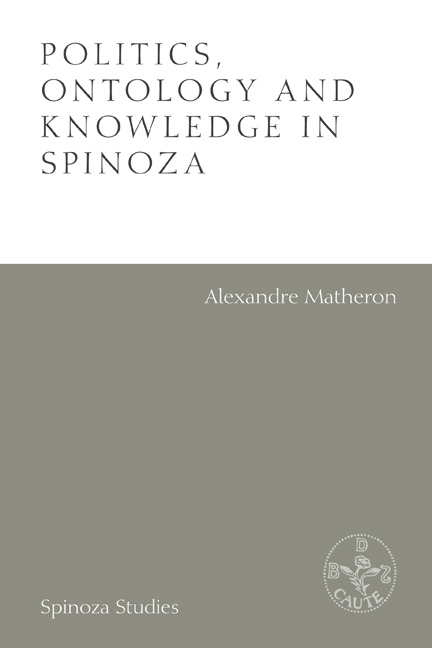Book contents
- Frontmatter
- Contents
- Abbreviations
- Notes on Translation and Acknowledgements
- A Revolutionary Beatitude: Alexandre Matheron’s Spinozism
- I Spinoza on Ontology and Knowledge
- 1 Idea, Idea of the Idea and Certainty in the Tractatus de Intellectus Emendatione and the Ethics
- 2 Essence, Existence and Power in Part I of the Ethics: The Foundations of Proposition 16
- 3 Physics and Ontology in Spinoza: The Enigmatic Response to Tschirnhaus
- 4 The Year 1663 and the Spinozist Identity of Being and Power: Hypothesis on a Development
- 5 Eternal Life and the Body According to Spinoza
- 6 Intellectual Love of God, Eternal Part of the amor erga Deum
- II Spinoza on Politics and Ethics
- 7 State and Morality According to Spinoza
- 8 Ethics and Politics in Spinoza (Remarks on the Role of Ethics IV, 37 Scholium 2)
- 9 Indignation and the Conatus of the Spinozist State
- 10 Passions and Institutions According to Spinoza
- 11 The Problem of Spinoza's Evolution: From the Theologico-Political Treatise to the Political Treatise
- 12 Is the State, According to Spinoza, an Individual in Spinoza’s Sense?
- 13 The Ontological Status of Scripture and the Spinozist Doctrine of Individuality
- 14 Spinoza and Power
- 15 Spinoza and Property
- 16 Spinoza and Sexuality
- 17 Women and Servants in Spinozist Democracy
- 18 The ‘Right of the Stronger’: Hobbes contra Spinoza
- 19 The Theoretical Function of Democracy in Spinoza and Hobbes
- 20 Spinoza and the Breakdown of Thomist Politics: Machiavellianism and Utopia
- Appendix 1 Interview with Laurent Bove and Pierre-François Moreau
- Appendix 2 Chronology of Works by Matheron
- Works Cited
- Index
2 - Essence, Existence and Power in Part I of the Ethics: The Foundations of Proposition 16
Published online by Cambridge University Press: 03 October 2020
- Frontmatter
- Contents
- Abbreviations
- Notes on Translation and Acknowledgements
- A Revolutionary Beatitude: Alexandre Matheron’s Spinozism
- I Spinoza on Ontology and Knowledge
- 1 Idea, Idea of the Idea and Certainty in the Tractatus de Intellectus Emendatione and the Ethics
- 2 Essence, Existence and Power in Part I of the Ethics: The Foundations of Proposition 16
- 3 Physics and Ontology in Spinoza: The Enigmatic Response to Tschirnhaus
- 4 The Year 1663 and the Spinozist Identity of Being and Power: Hypothesis on a Development
- 5 Eternal Life and the Body According to Spinoza
- 6 Intellectual Love of God, Eternal Part of the amor erga Deum
- II Spinoza on Politics and Ethics
- 7 State and Morality According to Spinoza
- 8 Ethics and Politics in Spinoza (Remarks on the Role of Ethics IV, 37 Scholium 2)
- 9 Indignation and the Conatus of the Spinozist State
- 10 Passions and Institutions According to Spinoza
- 11 The Problem of Spinoza's Evolution: From the Theologico-Political Treatise to the Political Treatise
- 12 Is the State, According to Spinoza, an Individual in Spinoza’s Sense?
- 13 The Ontological Status of Scripture and the Spinozist Doctrine of Individuality
- 14 Spinoza and Power
- 15 Spinoza and Property
- 16 Spinoza and Sexuality
- 17 Women and Servants in Spinozist Democracy
- 18 The ‘Right of the Stronger’: Hobbes contra Spinoza
- 19 The Theoretical Function of Democracy in Spinoza and Hobbes
- 20 Spinoza and the Breakdown of Thomist Politics: Machiavellianism and Utopia
- Appendix 1 Interview with Laurent Bove and Pierre-François Moreau
- Appendix 2 Chronology of Works by Matheron
- Works Cited
- Index
Summary
Proposition 16, as Tschirnhaus writes in Letter LXXXII, is perhaps the most important in all of Part I. But it is also the most paradoxical. Spinoza tells us that, to the extent that God is an absolutely infinite being, an absolute infinity of properties must be deducible from God's essence. And from this he concludes that God must produce in itself an absolute infinity of effects. But what right does he have to identify properties with effects? The fact that these both are two species of the genus ‘consequence’ proves nothing: the extension of geometers, for example, has an infinity of properties (all the properties of every conceivable figure), but it does not produce any effects! How then are we to justify this identification that Spinoza presents ex abrupto as obvious? Nothing encountered previously, it seems, would have prepared us for this.
And yet, yes. Many things, in fact, already would have prepared us for this. Not always in the form of demonstrations, but a whole series of indications that had as their guiding thread a common principle: the principle of the total intelligibility of all of the real, which organises the whole axiomatic of Part I, and which, if we deepen it, must entail as a consequence the necessity of a total realisation of all of the intelligible.
Some important suggestions already take us down this path, beginning with the first eight propositions, which are dedicated to the deduction of the properties of ‘substances having one attribute’ (I accept Gueroult's expression, on the condition that it means ‘substances having one attribute and considered only under this attribute’). Proposition 7 is very important in this respect, as well as the two Scholia of Proposition 8. Next, another suggestion can be glimpsed throughout Propositions 9 and 10, where Spinoza establishes the conceivability of his concept of God. Then the demonstrations of the existence of God lead us further and further following a very progressive order. Finally, the Scholium to Proposition 11 leads us to a fundamental intuition on the basis of which Proposition 16 becomes self-evident.
These are the four points that I wish to develop here.
- Type
- Chapter
- Information
- Politics, Ontology and Knowledge in Spinoza , pp. 14 - 26Publisher: Edinburgh University PressPrint publication year: 2020

